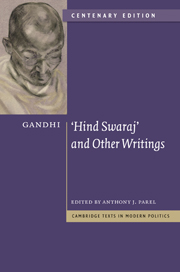Book contents
- Frontmatter
- Contents
- Preface to the centenary edition
- Acknowledgements
- Editor's introduction to the centenary edition
- Editor's introduction to the 1997 edition
- A note on the history of the text
- Principal events in Gandhi's life
- Biographical synopses
- Guide to further reading
- Glossary and abbreviations
- HIND SWARAJ
- Contents
- Preface to the English translation
- Foreword
- I The Congress and its officials
- II The Partition of Bengal
- III Discontent and unrest
- IV What is Swaraj?
- V The condition of England
- VI Civilisation
- VII Why was India lost?
- VIII The condition of India
- IX The condition of India (cont.): railways
- X The condition of India (cont.): the Hindus and the Mahomedans
- XI The condition of India (cont.): lawyers
- XII The condition of India (cont.): doctors
- XIII What is true civilisation?
- XIV How can India become free?
- XV Italy and India
- XVI Brute force
- XVII Passive resistance
- XVIII Education
- XIX Machinery
- XX Conclusion
- I APPENDICES
- SUPPLEMENTARY WRITINGS
- Bibliography
- Index
VI - Civilisation
Published online by Cambridge University Press: 05 October 2014
- Frontmatter
- Contents
- Preface to the centenary edition
- Acknowledgements
- Editor's introduction to the centenary edition
- Editor's introduction to the 1997 edition
- A note on the history of the text
- Principal events in Gandhi's life
- Biographical synopses
- Guide to further reading
- Glossary and abbreviations
- HIND SWARAJ
- Contents
- Preface to the English translation
- Foreword
- I The Congress and its officials
- II The Partition of Bengal
- III Discontent and unrest
- IV What is Swaraj?
- V The condition of England
- VI Civilisation
- VII Why was India lost?
- VIII The condition of India
- IX The condition of India (cont.): railways
- X The condition of India (cont.): the Hindus and the Mahomedans
- XI The condition of India (cont.): lawyers
- XII The condition of India (cont.): doctors
- XIII What is true civilisation?
- XIV How can India become free?
- XV Italy and India
- XVI Brute force
- XVII Passive resistance
- XVIII Education
- XIX Machinery
- XX Conclusion
- I APPENDICES
- SUPPLEMENTARY WRITINGS
- Bibliography
- Index
Summary
reader: now you will have to explain what you mean by civilisation.
editor: It is not a question of what I mean. Several English writers refuse to call that civilisation which passes under that name. Many books have been written upon that subject. Societies have been formed to cure the nation of the evils of civilisation. A great English writer has written a work called ‘Civilization: its Cause and Cure’. Therein he has called it a disease.
reader: Why do we not know this generally?
editor: The answer is very simple. We rarely find people arguing against themselves. Those who are intoxicated by modern civilisation are not likely to write against it. Their care will be to find out facts and arguments in support of it, and this they do unconsciously, believing it to be true. A man, whilst he is dreaming, believes in his dream; he is undeceived only when he is awakened from his sleep. A man labouring under the bane of civilisation is like a dreaming man. What we usually read are the works of defenders of modern civilisation, which undoubtedly claims among its votaries very brilliant and even some very good men. Their writings hypnotise us. And so, one by one, we are drawn into the vortex.
reader: This seems to be very plausible. Now will you tell me something of what you have read and thought of this civilisation?
- Type
- Chapter
- Information
- Gandhi: 'Hind Swaraj' and Other Writings , pp. 33 - 37Publisher: Cambridge University PressPrint publication year: 2009
- 1
- Cited by

